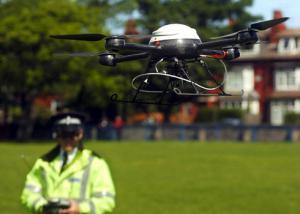SurveillanceMany sections of Baltimore are under secret, constant aerial video surveillance by BPD
The Baltimore Police Department has secretly deployed a surveillance system using planes and powerful cameras that can continuously record 30-square-mile sections of the city at once. The technology, which is run by a private company, was originally developed for the Defense Department for use in Iraq. It stores the video footage for an undetermined amount of time, and police can use it to retroactively track any pedestrian or vehicle within the surveillance area.

A New Jersey police officer with a surveillance // Source: commons.wikimedia.org
The Baltimore Police Department has secretly deployed a surveillance system using planes and powerful cameras that can continuously record 30-square-mile sections of the city at once, Bloomberg News reported.
The technology, which is run by a private company, was originally developed for the Defense Department for use in Iraq. It stores the video footage for an undetermined amount of time, and police can use it to retroactively track any pedestrian or vehicle within the surveillance area.
David Rocah, senior staff attorney with the American Civil Liberties Union of Maryland, said: “The fact that the BPD has been engaged in a secret program of mass surveillance is both incomprehensible and unacceptable. It is even more astounding that this could be done during a Justice Department investigation into the BPD that found pervasive racial bias and lack of accountability.
“The surveillance program itself is a privacy nightmare come to life and precisely what we have warned against for years. It’s the equivalent of requiring each of us to wear a GPS tracker whenever we leave our homes, something that would never be tolerated in the physical world.
“This is yet another example of battlefield technology moving to domestic law enforcement without public scrutiny — but Baltimore is not a battlefield, and its residents are not the enemy. The BPD should immediately discontinue its use of the technology, and the City Council should immediately hold hearings to prevent it from ever being adopted. The council should also require public input before any new surveillance technologies are deployed.”
BPD spokesman T. J. Smith insisted that the privately funded agreement between Ohio-based Persistent Surveillance Systems and city police “was not a secret surveillance program” – even though, before Wednesday, the mayor, city council, and board of estimates had not been told about the program.
“There was no conspiracy not to disclose it,” Smith told the Guardian.
Bloomberg Businessweek reported that Persistent Surveillance Systems began working in Baltimore in January.
Ross McNutt, the company’s founder, said the company’s surveillance system worked like “Google Earth with Tivo”: megapixel cameras on a Cessna aircraft continuously photograph the city.
The program uses wide-area imagery which captures thirty-two square miles of the city, allowing BPD investigators to move back and forth in time, following suspects.
Smith said that the program was in use for 100 hours between January and February, and another 200 hours over the summer. The surveillance program will continue for a few more weeks, and the BPD will then evaluate the results to see whether to enter into a permanent agreement with Persistent Surveillance Systems.
“This effectively is a mobile CitiWatch camera,” Smith said, referring to the system of nearly 700 manually operated surveillance cameras spread throughout the city. “We have the near real-time ability to follow up on a situation after a 911 call is made,” he added.
The company noted that the imagery data, which is stored for forty-five days unless it is part of investigation, can only be accessed by the company’s analysts, who in turn provide information to “detectives, prosecutors, defense attorneys, and the courts.”
McNutt told the Guardian that so far, his company had provided the Baltimore police with 102 “investigation briefs,” but not all of those led to arrest.
Jake Laperruque, a government surveillance expert at the Constitution Project, told the Guardian that the surveillance currently practiced by Baltimore police is in unclear legal standing.
“It’s definitely something that’s currently being litigated in a number of areas,” said Laperruque. “There’s a strong case to be made, based on what the supreme court has said in the past, that there is a constitutional right to be free from pervasive location tracking without court authorization.”
He added that, absent answers from the Baltimore police about when and how the surveillance technology is used, there “definitely is potential for serious abuse.”
“What’s to say that the Baltimore police couldn’t zoom in on a protest, on a religious ceremony, on an abortion clinic, or just to track people in an arbitrary or improper manner?” he asked.
— Read more in in this in-depth blog post, which contains additional analysis
